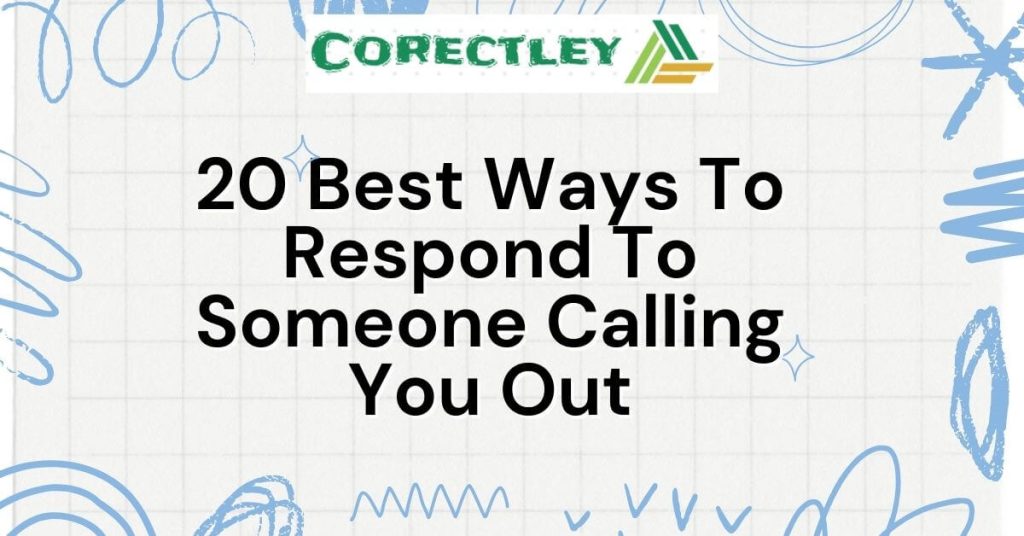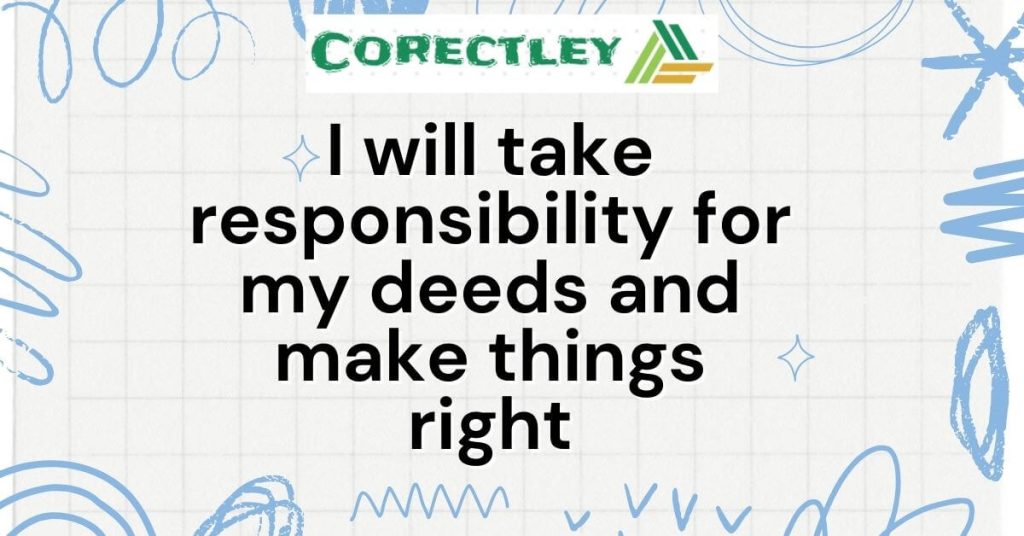There are a lot of different ways to respond when someone calls you out. In this article, I will pinpoint significant responses that are extremely fitting for such circumstances.
On the off chance that you are being called out by somebody, it’s for some reasons which incorporate;
- They accept the person’s misunderstands followed through with something
- They feel your activities, and words, have hurt them and others
- They are attempting to pinpoint something to you
- This was finished to consider you responsible for something that you have done.
- They believe your character doesn’t go over well with other people and want to fix it right away, so they want to change a particular issue.

20 ways to respond when you are called out.
1. I thank you for your honesty and will take your feedback into consideration
When someone criticizes you, you can show your appreciation for their honesty and promise to consider their feedback. This is a significant step since it assists with suppressing any further acceleration or battling.
You have taken out yourself from any type of a showdown. It likewise shows that you can consider it, subsequently saving yourself from superfluous quarreling while at the same time saving the occasion.
2. Your concerns are clear to me and I will discuss this further.
This response demonstrates that you have acknowledged the issue at hand and will be open to a discussion about it when you are called out.
Numerous complaints come from false impressions, among people and when the ground is open for a protected discussion, a center ground is handily accomplished.
It is more straightforward to discover a sense of reconciliation when one sets has an open point of view. You comprehend that for the struggle to be settled, a conversation between the gatherings can’t have stayed away from.
3. I would like to understand your point of view
A decent response to being called out is expressing that you might want to figure out their point of view. You probably don’t know what’s going on, and learning more about your offense will help you understand.
Your brain can change whenever you are keen on hearing more about the other person’s perspective and you will tune in. You won’t believe how effectively this action can avert disaster.
4. I am sorry I offended you I didn’t mean to come off that way
An incredible method for answering is to apologize to the oppressed party. A crucial life skill is to apologize when you are criticized. It ends nearly all known conflicts and prevents rage and strife from festering for too long.
At the point when outrage putrefies it is typically touchy and has unseen side-effects. By saying ‘sorry’ you show them you comprehend your activity has caused them damage or offense and you lament making it happen. As basic as this response sounds it can weaken what is going on.
5. Thank you for letting me know this, I will work to be better in the future
This response begins with a thank you and I say this is an extraordinary beginning. Your grateful worries followed by a readiness to forestall further issues for them will permit them the space to pardon you. Offenses can occur without you understanding you are causing somebody a lot of aggravation.
In such a circumstance you genuinely must cause them to comprehend you are grieved and will guarantee that you work on yourself. Your behavior or character will be watched and changed, and sometimes being careful is all that matters.
6. Can we work together and find a solution that is beneficial to both of us?
At the point when there is a struggle, you can determine this by being willing to figure out the issue. This will permit the two players to express their terms and find a center ground for an answer.
This response shows that you are ready to team up with the other person to find a goal that is ideally suited for you both. Struggle can be settled through a trade-off where the two people both advantage eventually.
7. I see this issue is important to you, and I will take the steps to address this matter
Acknowledging the significance of the situation on the ground and promising to schedule a time to discuss it is a smart response to being called out. Assuming somebody calls you out it implies that they disapprove of you which is significant.
Understanding the meaning of the issue is a decent initial step, the subsequent step is your readiness to make a move for an answer. By doing this, it is outside the realm of possibilities for struggle to wait for quite a while.
8. Your point is valid and I want to hear your thoughts on this beauty
This response lets the other person know that you agree that their point is valid and that you will discuss it with them. Now and again everything necessary to tackle an issue is seeing the point of view of someone else.
This will permit a cycle where every person’s considerations will be expressed straightforwardly without battling or quarreling. A great deal can be accomplished in compromise if contemplations can be circulated brazenly.
9. Can we have a conversation so that I can better understand the situation?
I relate most with this response in light of its ability to settle clashes rapidly. Frequently an answer between two people must be gotten when there is a readiness to cooperate and track down a functioning arrangement.
This requires exertion, time, and genuineness. This kind of response demonstrates sincerity and your desire to improve the situation. As I said previously, working things out is an extraordinary method for settling clashes.
10. I will take responsibility for my deeds and make things right

Quite possibly the best response, when called out, is to claim liability regarding each move you have made. This demonstrates your responsibility and shows you are accountable.
By saying this, you have displayed acknowledge of liability regarding your activities and will pursue making the appropriate changes. This will keep the other party quiet, it fills in as a statement of regret with a side serving of consistent fellowship.
Putting forth things right is an attempt that starts by assuming a sense of ownership of your activities. On the off chance that you invest an excess of energy guarding your activities, you will barely leave a mark on settling the struggle.
11. My actions toward you have been wrong, and I want to rectify that so we make amends
Assuming liability implies you need to comprehend how your activities have caused the other person damage or distress. This is additionally a conciliatory sentiment that makes you ready to settle the pressure among you.
This response lets them know you comprehend the improper idea of your activities and will make things right. A statement of regret can appear to be straightforward however on the off chance that they aren’t genuine, it just heightens what is going on. Listening, analyzing, and remaining open to what they have accused you of are all necessary for understanding what they are pointing out against you.
12. Thank you for bringing this to my attention, can we address this issue together?
This response is a call for settling clashes genially between two lamented parties. You have shown appreciation for them letting you know how you have insulted them and you additionally let them know you will address this with them.
Struggle can’t be settled when two gatherings are seas separated, and except if the two of them meet up, nothing is settled. This is a way you can show your obligation to settle the issue on the ground.
13. I am truly sorry for any harm or offense, I want to make this right by you
Conflict resolution will benefit from your apologizing for your actions. At the point when somebody gets down on you, it typically implies you have caused them hurt, this might be regardless of your insight.
At a second like this, it is critical to apologize and push ahead by searching for answers to settle the matter. Moving beyond an issue is effective when deliberately our endeavors carry harmony to the matter.
14. Let’s have an honest and open conversation about this
Tell the truth in a discussion is a decent approach to determining a contention cautiously. With a response like this, you are showing them you will tell the truth in discussion.
It lets them know you need an immediate and straightforward discussion about the issue. Assuming that you endeavor to determine the matter by any exploitative means, it rules out a compromise, so your answer ought to be bound with trustworthiness. At the point when you are called out, attempt to try to avoid panicking so the circumstance doesn’t get warmed.
15. Can we find a solution that works for everyone
A quiet response, when called out, is conceding you will cooperate and find an answer that will benefit both of you. Without splitting the difference, an ideal arrangement might in all likelihood never be found, so you must constantly enter any discussion to think twice.
The principal thought of this response is to permit the two players to invest the effort and emerge with a reasonable comprehension of the matter. This explanation is the foundation of a delightful compromise.
16. I understand that you have been hurt by me, and I apologize for that.
They will point you out if you have hurt someone. The correct thing to do in such a matter is to apologize from your heart about how sorry you are for causing them torment. I loathe being harmed and nor do most people on the planet.
This response demonstrates that you are sorry for the harm you have inflicted on them and are aware of it. This might mellow the core of the other person, which can prompt you to be pardoned, understand all that takes time, and try not to pressure them.
17. Can you help me understand how I have offended you?
This response shows that you will become familiar with the issue and make strides in tracking down an enduring arrangement. They have criticized you because you may have hurt the other person in some way.
Here, show that you will advance the circumstance emphatically. You let them account for themselves, paying attention to comprehend as opposed to going into a cautious position. Now that you have a clear picture, you can find a way to successfully resolve a conflict.
18. Thank you for your candor, I will ensure no more future offense between us
A call-out resembles criticism of something you have done. This response shows that you are thankful for their fair objection and that you intend to be more insightful about your activities towards them.
persons who have been harmed need consolation that such things won’t be rehashed in that frame of mind, there is no desire for a goal assuming there is reiteration. With this answer, you can show your appreciation for their trustworthiness and regret.
19. Can you forgive me and allow me to fix this
A speedy and great response to being called out is requesting a pardon and a valuable chance to fix the issue. Each one might develop from encounters and this isn’t unique. The other party will be more likely to listen to you and come up with a solution if they see that you are sorry.
20. I don’t appreciate being spoken to in that manner
This response is required when you hate being placed on a spot. You let them know that you would prefer for them to speak to you calmly about all of their mistakes. This is a preferable way to compromise over quarreling or battling. Answer this way with an impartial tone.